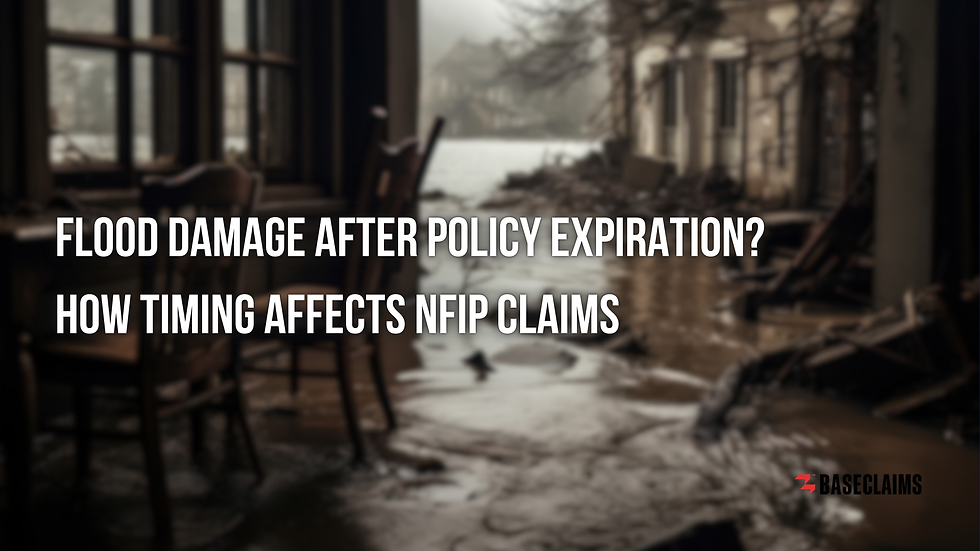Mold Damage Claims: What’s Covered, What’s Not, and What to Do Next
- Benji Licht
- Apr 16, 2025
- 3 min read
Updated: May 15, 2025
🦠 Is Mold Damage Covered by Insurance?

Mold damage can often lead to significant damage to your property, both structurally and financially. However, homeowners’ insurance coverage for mold damage insurance can vary widely, depending on the cause and nature of the mold. Typically, insurance policies will cover mold damage if it is caused by a covered peril, such as a burst pipe or roof leak. However, coverage is often denied for mold caused by neglect or lack of maintenance.
For homeowners, understanding how mold damage is addressed by insurance can be tricky. It’s essential to know what’s included, what’s excluded, and the steps to take if your mold damage claim is denied.
✅ What’s Covered Under Mold Damage Insurance?
Many insurance policies cover mold damage if it results from a covered event, such as water damage from a leaking pipe, heavy rain, or even accidental flooding. If mold grows as a consequence of an insured event, then you may be able to file a claim for repairs.
Some policies might also provide coverage for mold damage claims when it arises due to a sudden and accidental event. For example, if a plumbing issue causes water to leak into walls and fosters mold growth, this could be included under your home insurance policy.
However, coverage can be limited, especially when mold results from slow leaks or poor maintenance. Insurance companies generally do not cover damage from mold that occurs over time due to neglect or inadequate home upkeep.
🚫 What’s Excluded from Mold Damage Claims?
While some scenarios are covered under your insurance policy, others are explicitly excluded. Insurance typically won’t cover mold damage that results from long-term neglect or lack of maintenance. For instance, mold caused by poor ventilation, roof leaks, or failed weatherproofing is usually not covered.
Additionally, many policies limit the amount they’ll pay for mold removal, even if it’s caused by a covered peril. Some policies might include a specific dollar limit or restrict coverage to certain parts of the house, such as walls and ceilings, but not furniture or flooring.
Another common exclusion involves mold that appears as a result of flooding, which requires separate flood insurance coverage. If your property is prone to flooding, it's critical to consider purchasing additional flood insurance to avoid the risk of being underinsured.
📄 What to Do If Your Mold Claim Is Denied?
If your mold claim has been denied, there are still steps you can take to potentially turn things around. Many homeowners’ insurance policies contain clauses that can make getting a claim approved a challenge, especially in cases where mold is considered to result from gradual damage.
One option is to appeal the decision. Insurance companies are required to review claims fairly, and if they’ve wrongly denied your claim, it might be possible to get them to reconsider. You can also work with a public adjuster, a professional who can help you understand your policy and ensure that your case is presented correctly to the insurer.
If you’ve received a denial for a mold claim denied, a public adjuster may be able to identify overlooked factors in your case and assist in getting a higher payout for the repairs. These professionals are skilled at negotiating with insurance companies and can provide valuable insight into the claims process.
🧼 How to Avoid Mold Damage in the Future
Preventing mold from taking root in your home requires ongoing attention. Regular maintenance, such as checking for leaks, maintaining your roof and gutters, and ensuring proper ventilation in moisture-prone areas like bathrooms and kitchens, can help reduce the risk of mold growth.
Here are a few preventive measures you can take to minimize the likelihood of future mold issues:
Fix leaks immediately to prevent water from accumulating.
Install a dehumidifier in damp areas.
Ensure proper ventilation in your home, particularly in high-moisture areas like bathrooms and basements.
By taking these proactive steps, you can minimize the chances of mold developing in your home and reduce the likelihood of needing to file a claim.
🛠 Dealing with Mold Damage
Dealing with mold damage claims can be frustrating, especially if the damage is extensive or your claim is denied. However, understanding what is and isn’t covered under your policy is key to navigating the process successfully. Regular home maintenance, prompt repairs, and working with professionals can help prevent mold growth and make your insurance claims process smoother.
If you’re facing mold-related damage and need assistance with your claim, it’s important to consult with professionals who can guide you through the process, whether it’s handling the insurance negotiations or providing expert assessments of the damage.
Benjamin Licht 954-589-8710
Office 954-466-5730
Don’t wait until it’s too late






Comments